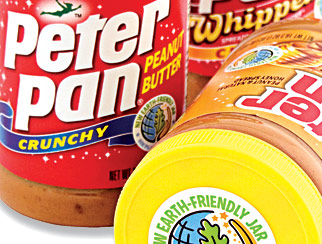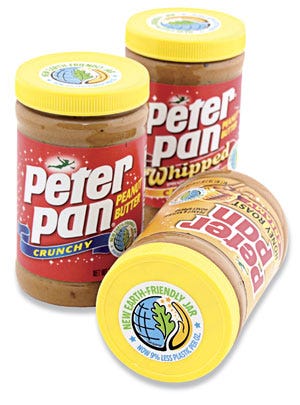January 29, 2014


Sustainable jars soar for Peter Pan
At the forefront of sustainability initiatives, giant packaged food supplier ConAgra Foods, Omaha, NE, has moved to a more sustainable plastic jar for Peter Pan® peanut butter products.The company says the new Peter Pan jars use about 12 percent less plastic across core jar sizes, which equates to eliminating enough plastic to fill more than 24 garbage trucks each year with solid waste. Says Karl Sears, vp and general manager of ConAgra Foods, “We know that consumers of Peter Pan peanut butter are environmentally-conscious and are actively looking for brands that fit their budget and promote sustainability. The new 16.3-oz jar reduces plastic while still offering consumers an attractive entry price point for the category. It's a tremendous 'win' for retailers and consumers.”
Peter Pan began communicating the “green” message on the jars in August, with fresh, new labeling. ConAgra's brands include Healthy Choice, Chef Boyardee, Banquet, La Choy, Hunt's, Wesson, Van Camp's, Hebrew National, PAM, Egg Beaters and Orville Redenbacher's, so the company produces a huge amount of packaging. These brands are in 97 percent of America's households.
One of many examples
ConAgra began developing new environmental programs last year from compliance-driven to proactive sustainability initiatives. Gail Tavill, vp of sustainable development at ConAgra Foods, talked with PD(see PD, Nov. '08 p. 22) about some of those environmental programs. At that time, she says the company was improving various frozen meal and entrée packages to make them more environmentally friendly and moved from a multilayer barrier bottle for Hunt's ketchup to a monolayer version that uses an oxygen-scavenging technology. Tavill mentioned that ConAgra has had a sustainability development program in place since the early '90s.
The company also won a DuPont award this year for its new PCRPET-containing trays for frozen foods that include 40 percent post-consumer-recycled PET, which reduces the need for virgin PET and supports the frozen food-tray market for PCR material (see PD, July, '09, p. 30).
“As a company, ConAgra Foods is committed to improving the sustainability of our product packaging while exceeding the needs and expectations of our customers and consumers,” says Tavill. “The new peanut butter jars help us reduce our reliance on fossil fuel resources, save energy and reduce greenhouse gas emissions.”
The two main Peter Pan packages include a 28-oz jar that now uses 12 percent less plastic than the previous 28-oz jar. This equates to nearly 65 tons of plastic per year. “On the 28-oz jar, there was a 12.7-percent reduction in weight but the product content remains the same,” says Tavill.
ConAgra also switched from an 18-oz jar configuration to a 16.3-oz jar size for its smaller product size offering. Like the 28-oz size, the new 16.3-oz jar uses significantly less plastic, but was lightweighted more than the product content was downsized, Tavill points out. The new 16.3-oz jar weight was reduced by 9 percent on a “per-ounce” basis, meaning that the plastic savings didn't result solely from the smaller jar size. The new 16.3-oz jar has a suggested retail price that's 10 cents less than the earlier 18-oz jar, although prices vary by retailer. “We only optimized the packaging on the other sizes,” says Tavill. “We downsized a 40-oz jar though not as significantly. It went from 58.5 g to 56 g of product, which equates to about a 4.3-percent reduction.”
Centrally managed at the corporate level and executed at the local level by cross-functional managers at each plant, the sustainability initiatives are driven with help from Tavill, who considers the many strategies of brands under the ConAgra umbrella and looks at where sustainability can play a role within those brands.
For the Peter Pan peanut butter line, ConAgra has chosen a clean, custom PET jar design blow-molded by Constar Intl. At this point, the jar material incorporates no recycled content, Tavill says, though that could change in the future.
“Right now, RPET isn't available at a cost-effective price,” she notes. “Food-grade RPET is available, but for this application, we have not been able to find anyone who has developed a cost-effective version yet for jars and bottles. We have been highly successful at finding cost-effective RPET, particularly for our frozen food tray applications, and we have talked to several converters about PET bottles. It may be different for beverage bottles, but for jars and bottles for food, so far, we haven't seen a cost-effective solution.”
Shape is changing
The bright yellow PP jar closures were also modified, which meant some changes were made to ConAgra's packaging equipment. “We had to modify it from a deep skirt to a short skirt closure, so we also saved some packaging resin in the closures as well, which required updates to the capping equipment and the handling of the closures,” Tavill tells PD.Berry Plastics provides the 70-mm Kerr continuous-threaded closures for the 16-oz jar (the caps also incorporate an induction seal liner). The new closure is a third shorter, so it uses less gram weight of PP, Tavill explains.
“By making the closure shorter, the finish on the jar had to be made shorter and a lot of resin in a blow-molded container goes to the finish. So making the smaller finish, we can redistribute some of the material, and that's one reason we could lightweight the jar itself,” she says.
A pressure-sensitive spot label placed on the top of jar reads, “New earth-friendly jar, now 9% less plastic per oz.” The company also added a graphic to the main jar label that communicates the same earth-friendly details. “We use this to bring attention to the new jars but it will be a temporary addition,” Tavill points out.
Constar created the jar for ConAgra to have what it says is “knifeability,” explains Tavill. “If you look at the old package versus the new one, the former jar had a signature curved shoulder at the top that became the signature shape for Peter Pan,” she says. “The curve had some issues because it made it a bit tricky to get at the peanut butter in that spot. But it was a distinctly shaped jar and had a deep-skirt closure.” To her knowledge, Tavill says, the packaging change had little impact on jar-filling equipment, but if changeparts were needed, they were few, and the changes were probably minor. There were no major capital equipment investments required.
Big-picture goals
ConAgra's move to a new peanut butter package is further evidence of its various ongoing advances in sustainability. More of these projects are being planned.
“I can't discuss any changes to our packaging sustainability goals at this time, but we have some other things—bigger issues—that we'll be prepared to talk about around our energy footprint, water and waste and some other things soon,” adds Tavill. “We have to wrap up some of these things internally before we're ready for prime time.”
Efforts cover the new and familiar
“Our sustainability efforts apply to optimizing both existing products and packaging and to new product and packaging introductions,” Tavill continues. “We have been doing this kind of thing for a while, so we look at sustainability and sustainable development related to packaging specifically as where we can implement material changes in terms of downsizing, lightweighting optimization—things our packaging engineers have done forever. One of my challenges is to capture the stories related to all of those things our packaging professionals and engineers have done.”
Tavill says that her team also helps tell the company's story as far as achieving its sustainability goals are concerned. “We're trying to help create an offensive playbook for packaging, particularly with sustainability issues. We're here to protect the safety of the products we sell and do great things at the same time. My team tells the stories about the things the company is already doing to improve the environment, and Peter Pan is a great example of that.”
More information is available: |
Constar Intl. Inc., 215/552-3735. www.constar.net |
Berry Plastics (Kerr), 812/424-2904. www.kerrgroup.com |
About the Author(s)
You May Also Like


